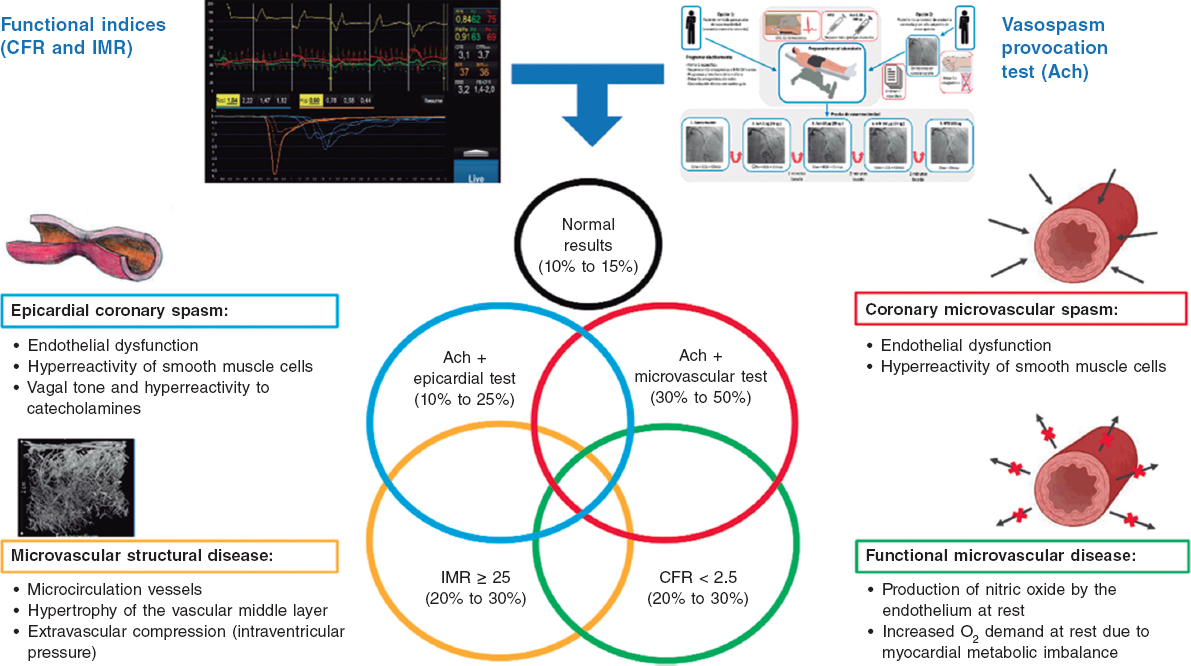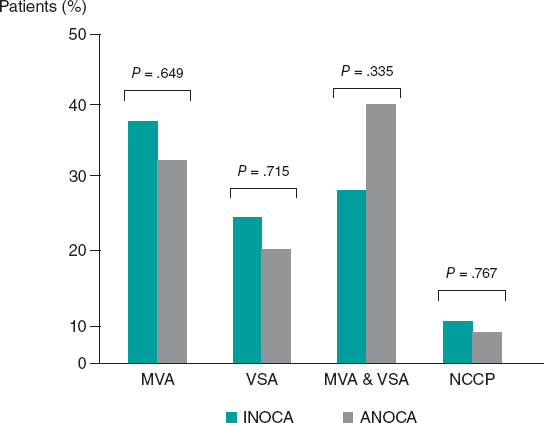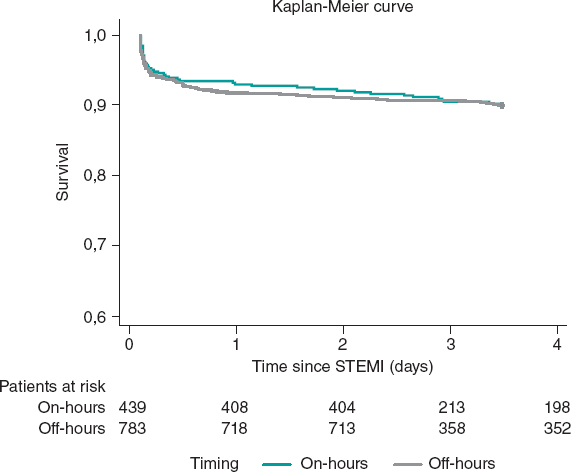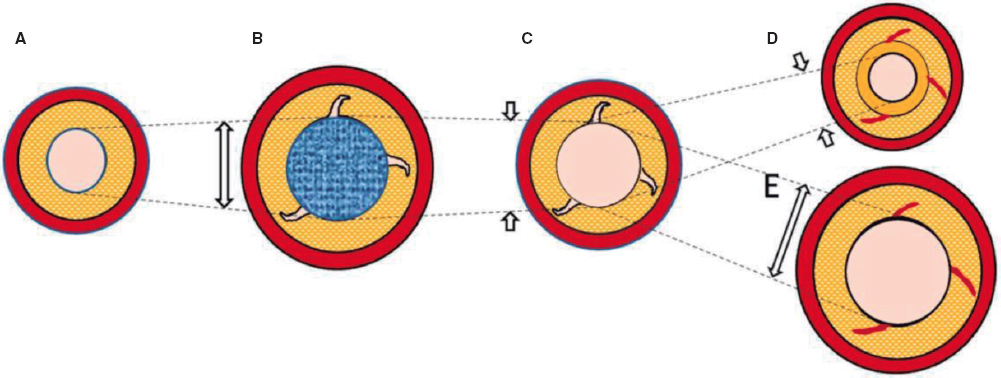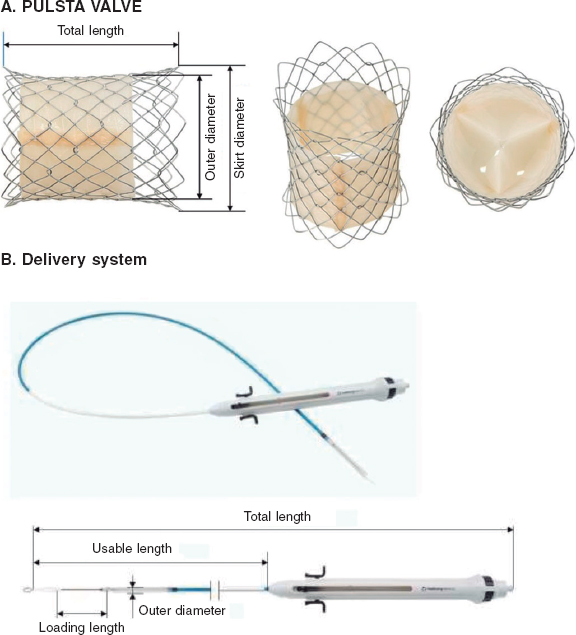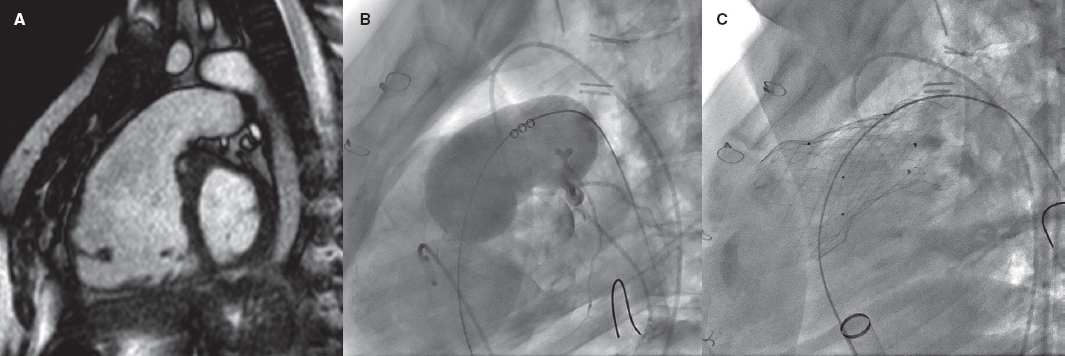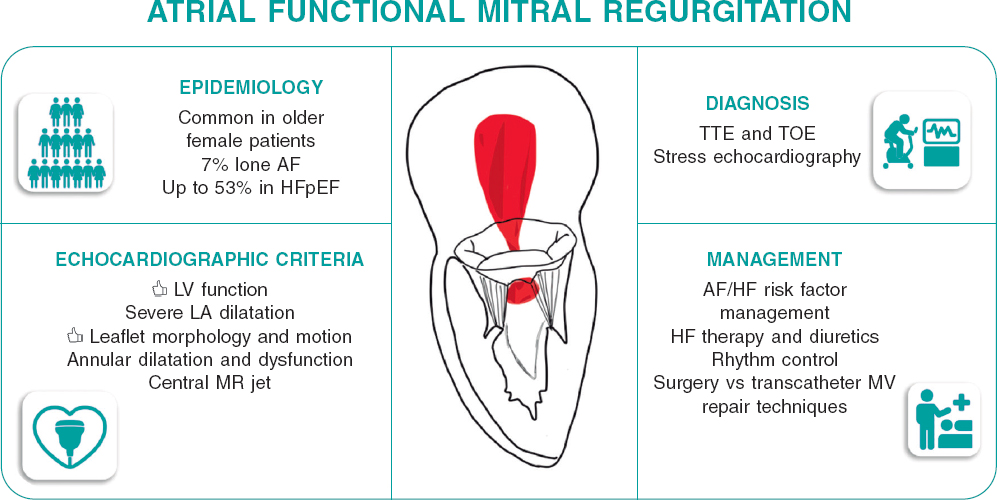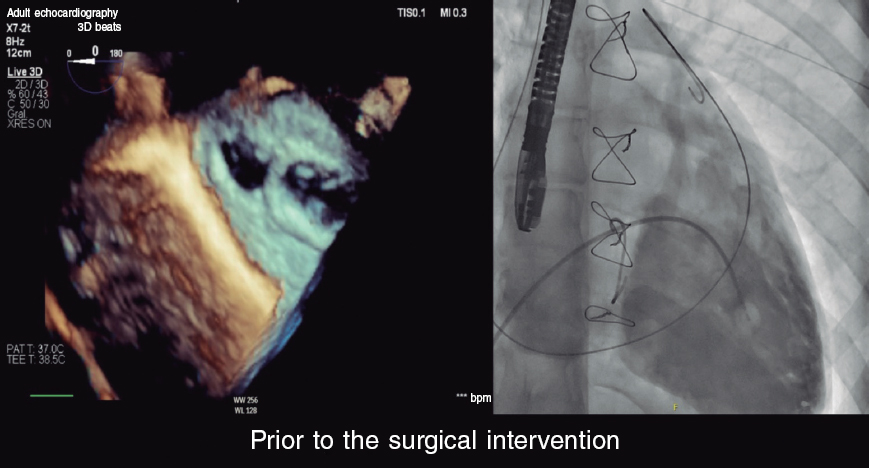QUESTION: Is there enough evidence to be able to say that the coronary recanalization of a chronic total coronary occlusion (CTO) improves the prognosis of patients?
ANSWER: No, there is not. However, many cardiologists believe so based on observational studies that report that patients with CTO who are successfully treated have better prognosis compared to those who undergo failed procedures.1 In many of these registries, the baseline characteristics, risk factors, ventricular function, and coronary anatomy are substantially different between patients treated successfully and those treated with failed procedures.2,3 When the outcomes are adjusted by these confounding variables, success in treatment does not condition the prognosis anymore.4
One less biased way to know the effect this has on the prognosis of patients undergoing percutaneous treatment of their CTO is to compare them to those who receive medical treatment. In this sense, several registries have been published with different results. For instance, in a study of patients with CTO treated percutaneously versus patients treated medically (using propensity-score matching), Ladwiniec et al.,5 showed a lower rate for the composite endpoint of death or myocardial infarction at 5 years, but not death as the single event that was favorable to those patients treated percutaneously. However, Yang et al.,6 with a similar matching of patients, did not show any benefits derived from treating the CTO. This shows that dozens of registries on CTO still cannot replace the need for randomized clinical trials.7,8
Very few studies randomizing patients to having their CTO treated or not have been published so far, and not all of them have had the assessment of cardiovascular events as their primary endpoint. The EXPLORE trial included 304 patients with a CTO as the non-culprit artery in individuals with ST-segment elevation myocardial infarction treated with primary angioplasty.9 At 4 months no differences were seen in the ejection fraction, the left ventricular end-diastolic volume (the primary endpoint) or cardiovascular events analyzed through cardiovascular magnetic resonance. By the way, the result of this study had somehow already been anticipated in a Spanish registry.10 The REVASC clinical trial randomized 205 patients with stable chronic coronary artery disease to treat or not to treat a CTO.11 At 6 months, no differences were seen in the global or segmental left ventricular function (the primary endpoint) or cardiovascular events analyzed through cardiovascular magnetic resonance between the 2 groups. The EuroCTO trial ranzomized 396 patients (2:1) to treat or not to treat a CTO.12 At the 12-month follow-up, no differences were seen in the rate of cardiovascular or cerebrovascular events reported in the arm where the CTO was treated. It should be mentioned that this study anticipated including 1200 patients but had to be interrupted prematurely due to its low inclusion rate. The IMPACTOR-CTO clinical trial randomized 96 patients with a CTO in their right coronary artery to receive percutaneous treatment or not.13 This study conducted in a single Russian center showed a reduction of ischemia and improved 6-minute walk test results without any changes in cardiovascular events.
Finally, the DECISION-CTO clinical trial has been the most important study published so far with 834 randomized patients.14 During a mean 4-year follow-up, the incidence of the composite endpoint of death, myocardial infarction or stroke was similar in both arms.
Therefore, to this day no randomized clinical trial or meta-analysis of all randomized clinical trials15 published so far has been able to prove that treating a CTO changes the prognosis of patients.
Q.: In what subgroups of patients or situations should we expect to see greater prognostic benefits?
A.: There is something clear: the CTO is a common lesion in patients with ischemic heart disease16 and its presence is associated with poor prognosis.17 Therefore, the issue is to be able to identify those patients whose prognosis may change with a percutaneous coronary intervention. The revascularization of a CTO that causes significant ischemia (> 10% quantified using imaging modalities) may improve long-term prognosis as a clinical trial is trying to prove: the ISCHEMIA-CTO (Nordic and Spanish Randomized Trial on the Effect of Revascularization or Optimal Medical Therapy in Chronic Total Coronary Occlusions with Myocardial Ischemia; NCT03563417). But before the ISCHEMIA- CTO findings become available, we will probably have the results of the ISCHEMIA (International Study of Comparative Health Effectiveness with Medical and Invasive Approaches, NCT01471522) clinical trial first. This study has been trying to prove something similar in patients who do not necessarily have a CTO. If the ISCHEMIA trial is positive, the hypothesis of revascularizing a CTO based on the presence of significant myocardial ischemia will be much more attractive.
Q.: And what about symptom and functional improvement?
A.: There are at least 2 studies that indicate that symptomatic patients can improve once their CTO has been treated. The FACTOR is a non-randomized clinical trial that showed improved quality of life test results in symptomatic patients.18 This is a small study of 125 non-randomized patients in whom the quality of life test is analyzed 1 month after the procedure. Also, it compares patients successfully treated versus patients with failed procedures. The benefit derived from successful treatment was greater in symptomatic patients and significant with respect to physical activity and quality of life according to the Seattle Angina Questionnaire. However, the most significant evidence of symptom improvement after treating a CTO comes from the EuroCTO clinical trial that showed modest symptomatic benefits in the quality of life test results after percutaneous treatment.12 However, the premature interruption of the study and its low inclusion rate make the results questionable.
Regarding functional improvement, there is also evidence that the treatment of a CTO modestly reduces the ischemic region in patients with at least mild to moderate ischemia19 and barely improves ventricular function,20 although we still do not know how these aspects may impact the patient’s clinical signs.
Q.: What clinical indications does the percutaneous revascularization of a CTO have?
A.: Today, the main indication for treating a CTO should be to improve symptoms in patients who remain symptomatic despite the optimal medical treatment.19 In order to achieve this, the occluded artery needs to be recanalized effectively, which totally depends on its angiographic characteristics and the experience of the interventional cardiologist in charge.
The current clinical guidelines of the European Society of Cardiology contemplate 1 indication only for the management of a CTO: patients with angina refractory to treatment and a significant ischemic region as seen on the imaging modalities.21 This is a class IIa indication with a B-level of evidence. As long as we don’t have any other evidence, we encourage all Spanish interventional cardiologists experienced in the management of CTO, who are actually many and with very good results,22 to include patients in the current ISCHEMIA-CTO randomized clinical trial. This clinical trial is essential and will shed light on many of the issues we have discussed here.
CONFLICTS OF INTEREST
None declared.
REFERENCES
1. Pancholy SB, Boruah P, Ahmed I, Kwan T, Patel TM, Saito S. Meta-Analysis of Effect on Mortality of Percutaneous Recanalization of Coronary Chronic Total Occlusions Using a Stent-Based Strategy. Am J Cardiol. 2013;111:521-525.
2. Mehran R, Claessen BE, Godino C, et al. Long-term outcome of percutaneous coronary intervention for chronic total occlusions. JACC Cardiovasc Interv. 2011;4:952-961.
3. BardajíA. Chronic total occlusion:To treat or not to treat. World J Cardiol. 2014;6:621-629.
4. Yamamoto E, Natsuaki M, Morimoto T, et al. Long-term outcomes after percutaneous coronary intervention for chronic total occlusion (from the CREDO-Kyoto registry cohort-2). Am J Cardiol. 2013;112:767-774.
5. Ladwiniec A, Allgar V, Thackray S, Alamgir F, Hoye A. Medical therapy, percutaneous coronary intervention and prognosis in patients with chronic total occlusions. Heart. 2015;101:1907-1914.
6. Yang JH, Kim BS, Jang WJ, Ahn J, Park TK, Song YB, et al. Optimal Medical Therapy vs. Percutaneous Coronary Intervention for Patients With Coronary Chronic Total Occlusion –A Propensity-Matched Analysis. Circ J. 2015;80:211-217.
7. Di Mario C, Sorini Dini C, Werner GS. Thousand Registries Are Not Worth a Randomized Trial. JACC Cardiovasc Interv. 2017;10:1535-1537.
8. BardajíA, Bonet G. Chronic total occlusion:No more meta-analysis, please –a randomized clinical trial is urgently needed. J Thorac Dis. 2015;7:E219-E221.
9. Henriques JP, Hoebers LP, Råmunddal T, et al. Percutaneous Intervention for Concurrent Chronic Total Occlusions in Patients With STEMI:The EXPLORE Trial. J Am Coll Cardiol. 2016;68:1622-1632.
10. Ariza-Sole A, Teruel L, di Marco A, et al. Prognostic Impact of Chronic Total Occlusion in a Nonculprit Artery in Patients With Acute Myocardial Infarction Undergoing Primary Angioplasty. Rev Esp Cardiol. 2014;67:359-366.
11. Mashayekhi K, Nührenberg TG, Toma A, et al. A Randomized Trial to Assess Regional Left Ventricular Function After Stent Implantation in Chronic Total Occlusion:The REVASC Trial. JACC Cardiovasc Interv. 2018;11:1982-1991.
12. Werner GS, Martin-Yuste V, Hildick-Smith D, et al. A randomized multicentre trial to compare revascularization with optimal medical therapy for the treatment of chronic total coronary occlusions. Eur Heart J. 2018;39:2484-2493.
13. Obedinskiy AA, Kretov EI, Boukhris M, et al. The IMPACTOR-CTO Trial. JACC Cardiovasc Interv. 2018;11:1309-1311.
14. Lee S-W, Lee PH, Ahn JM, et al. Randomized Trial Evaluating Percutaneous Coronary Intervention for the Treatment of Chronic Total Occlusion:The DECISION-CTO Trial. Circulation. 2019;139:1674-1683.
15. Barbarawi M, Kheiri B, Zayed Y, et al. Meta-analysis of Percutaneous Coronary Intervention Versus Medical Therapy in the Treatment of Coronary Chronic Total Occlusion. Am J Cardiol. 2019;123:2060-2062.
16. Råmunddal T, Hoebers L, S Henriques JP, et al. Chronic Total Occlusions in Sweden –A Report from the Swedish Coronary Angiography and Angioplasty Registry (SCAAR). PLoS One. 2014;9:103850.
17. Råmunddal T, Hoebers LP, Henriques JPS, et al. Prognostic Impact of Chronic Total Occlusions. JACC Cardiovasc Interv. 2016;9:1535-1544.
18. Grantham JA, Jones PG, Cannon L, Spertus JA. Quantifying the Early Health Status Benefits of Successful Chronic Total Occlusion Recanalization:Results from the FlowCardia's Approach to Chronic Total Occlusion Recanalization (FACTOR) Trial. Circ Cardiovasc Qual Outcomes. 2010;3:284-290.
19. Hirai T, Grantham JA, Sapontis J, et al. Quality of Life Changes After Chronic Total Occlusion Angioplasty in Patients With Baseline Refractory Angina. Circ Cardiovasc Interv. 2019;12:1-8.
20. Stuijfzand WJ, Biesbroek PS, Raijmakers PG, et al. Effects of successful percutaneous coronary intervention of chronic total occlusions on myocardial perfusion and left ventricular function. EuroIntervention. 2017;13:345-354.
21. Neumann F-J, Sousa-Uva M, Ahlsson A, et al. 2018 ESC/EACTS Guidelines on myocardial revascularization. Eur Heart J. 2019;40:87-165.
22. Amat-Santos IJ, Martin-Yuste V, Fernández-Díaz JA, et al. Procedural, Functional and Prognostic Outcomes Following Recanalization of Coronary Chronic Total Occlusions. Results of the Iberian Registry. Rev Esp Cardiol. 2019;72:373-382.
Corresponding author: Servicio de Cardiología, Hospital Universitario de Tarragona Joan XXIII, Dr. Mallafré Guash 4, 43007 Tarragona, Spain.
E-mail address: alfredo.bardaji@urv.cat (A. Bardají).



